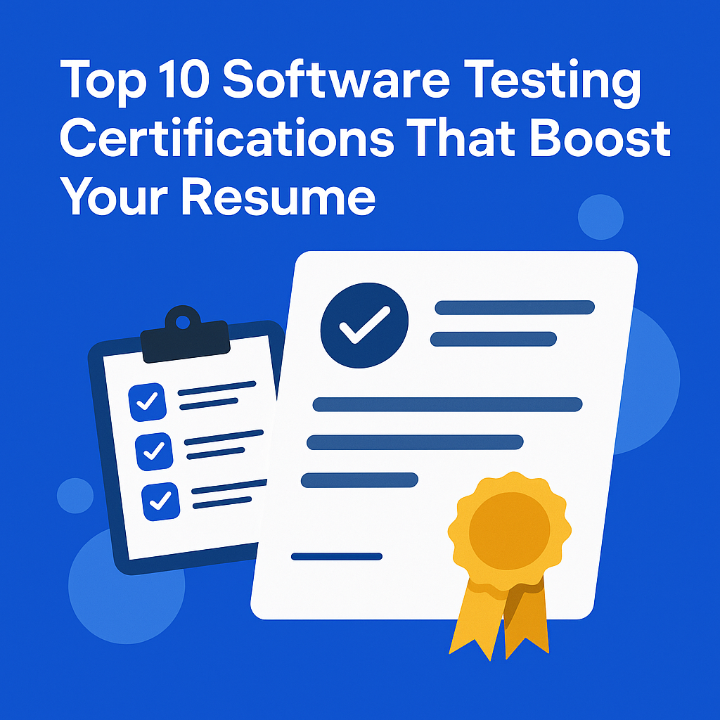 OTHERS
OTHERS Top 10 Software Testing Certifications That Boost Your Resume

In today’s hyper-competitive tech job market, having “QA Engineer” on your LinkedIn profile isn’t always enough. Recruiters want proof that you not only understand testing theory but can also apply it in real-world scenarios.
That’s where certifications come in. They validate your skills, build trust, and often give you a leg up in salary negotiations or international job applications. The right certifications can set you apart, whether you’re just entering the QA field or aiming for a senior role.
Here are the top software testing certifications for 2025 that can truly make a difference in your career:
1. ISTQB Foundation Level
The International Software Testing Qualifications Board (ISTQB) Foundation Level certification is the global benchmark for beginner QA testers.
- Why it matters: Recognized in 130+ countries. Covers testing fundamentals, SDLC models, static testing, test design techniques, and defect management.
- Who it’s for: Entry-level testers or professionals shifting into QA.
- Career impact: Often a prerequisite for QA roles in Europe and Asia. Certified testers report better job mobility internationally.
2. Certified Agile Tester (CAT)
Agile dominates software development, and testers need to adapt to shorter sprint cycles and continuous delivery. CAT proves you can thrive in Agile environments.
- Why it matters: Focuses on Agile principles, team collaboration, exploratory testing, and adapting to changing requirements.
- Who it’s for: Testers in Agile teams or those aiming to join fast-paced DevOps environments.
- Career impact: Increases your value in organizations adopting Agile at scale.
3. Certified Selenium Professional
With automation in demand, this certification showcases your ability to build test frameworks using Selenium.
- Why it matters: Covers Selenium WebDriver, locators, automation frameworks, and CI/CD integrations.
- Who it’s for: Manual testers moving into automation or automation engineers wanting formal validation.
- Career impact: Highly valued in automation-first companies and can unlock roles like SDET (Software Development Engineer in Test).
4. ISTQB Advanced Test Automation Engineer
An advanced-level certification that takes automation to the next level.
- Why it matters: Focuses on automation architecture, framework design, integration into CI/CD, and ROI measurement.
- Who it’s for: Experienced automation engineers.
- Career impact: Prepares you for senior automation engineer or QA architect roles.
5. Certified Mobile Application Tester (CMAT)
With mobile-first companies dominating the market, CMAT proves your ability to test mobile apps effectively.
- Why it matters: Covers Android & iOS testing strategies, usability testing, performance, and mobile-specific challenges.
- Who it’s for: Testers working on mobile-first apps or gaming platforms.
- Career impact: Employers in fintech, gaming, and healthcare industries value mobile testing expertise.
6. Certified Ethical Hacker (CEH)
Security is everyone’s responsibility, and CEH proves you understand how attackers think.
- Why it matters: Covers SQL injection, XSS, malware analysis, network scanning, and penetration testing.
- Who it’s for: QA engineers wanting to specialize in security testing.
- Career impact: Opens doors to hybrid QA + security roles, often with a 20–30% salary premium compared to traditional QA.
7. AWS Certified Cloud Practitioner (QA Focus)
Cloud adoption is booming, and testing in cloud environments is becoming a must-have skill.
- Why it matters: Validates your understanding of cloud architecture, deployment, and testing challenges.
- Who it’s for: QA professionals testing SaaS or cloud-native products.
- Career impact: Makes you attractive to organizations moving to AWS or multi-cloud setups.
8. Postman API Testing Certification
APIs are the backbone of modern apps, and API testing skills are in huge demand.
- Why it matters: Focuses on building automated API collections, mocking, validation, and CI/CD integration.
- Who it’s for: Testers dealing with microservices and backend-heavy apps.
- Career impact: Strong differentiator since API-first companies often prioritize API test automation.
9. PMI-ACP (Agile Certified Practitioner)
This certification is broader than CAT and is meant for those moving toward leadership.
- Why it matters: Covers Agile practices across Scrum, Kanban, Lean, XP, and TDD.
- Who it’s for: Senior QA engineers, leads, or managers.
- Career impact: Positions you for QA leadership roles in Agile organizations.
10. AI in Testing Certifications (Emerging)
With AI tools writing test cases and predicting defects, new certifications are emerging in this space.
- Why it matters: Covers AI-assisted test case generation, ML-based defect prediction, and ethical AI testing.
- Who it’s for: Forward-thinking QA professionals preparing for the future.
- Career impact: Early adopters will stand out in a market rapidly embracing AI.
Conclusion
Certifications are strong accelerators that validate your expertise, make you stand out in crowded applicant pools, and often lead to higher salaries and faster promotions. If you’re just starting, ISTQB Foundation is the safest bet. If automation excites you, go for Selenium Pro or ISTQB Advanced. For leadership, PMI-ACP will help you climb the ladder, while CEH sets you apart in security. The best approach is to pick certifications that align with where you want to be in 3–5 years, not just the role you’re in today.